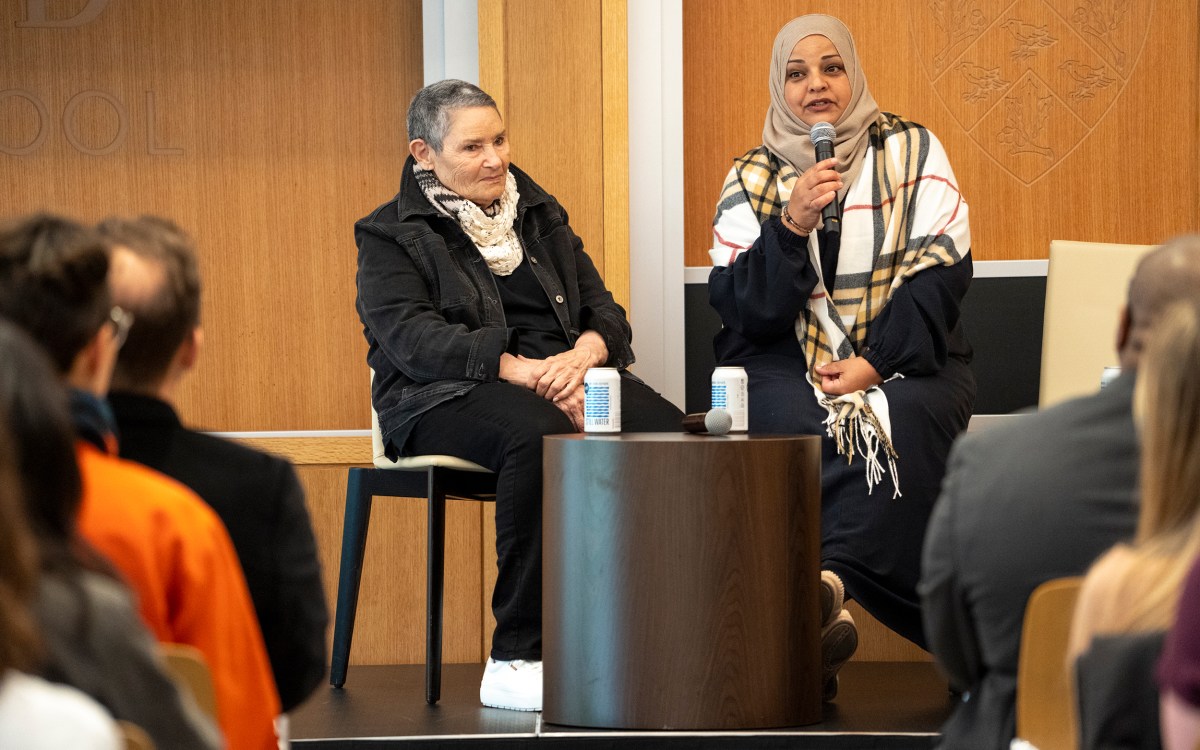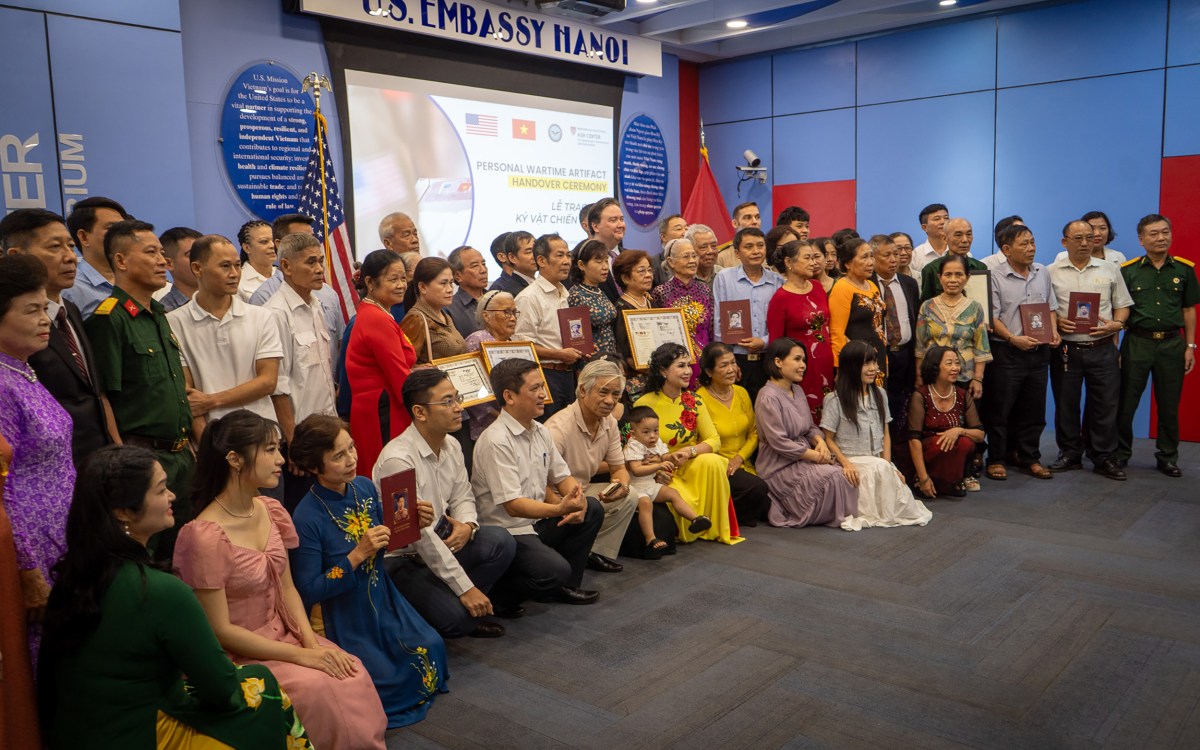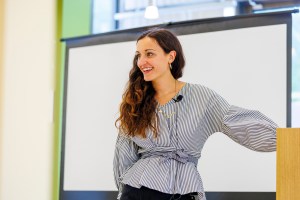Nation & World
-

A tale of three cities — and their turn to right in heartland
Government professor’s new book focuses on roles of race, class, and religion in evolution of former New Deal Democrats
-

Why do election polls seem to have such a mixed track record?
Democratic industry veteran looks at past races, details adjustments made amid shifting political dynamics in nation
-

You’d never fall for an online scam, right?
Wrong, says cybersecurity expert. Con artists use time-tested tricks that can work on anyone regardless of age, IQ — what’s changed is scale.
-

Two bereaved mothers who know price of war work for peace
Layla Alsheikh, Robi Damelin argue path to Mideast reconciliation begins with acknowledging common humanity
-

Taking the phones out of school
In podcast episode, experts discuss growing movement to restrict devices in class
-

‘The first new information we’ve heard in 50 years’
Unseen Legacies researchers are answering decades-old questions about the fates of Vietnamese soldiers
-
Genuine debate illuminates knotty ethical questions
Should students receive financial compensation for high test scores? Would a market for organ donation make saving lives more efficient? Should a nation be permitted to buy the right to pollute? These questions represent just a few of the many ethical issues that Harvard professors Michael Sandel, Amartya Sen, and visiting professor Philippe van Parijs from the University of Louvain (Belgium) have been considering this semester.
-
Where science and religion meet, from an Islamic perspective
Where and how science and religion intersect is a debate that dates back centuries; it’s also a regular part of contemporary discourse. The discussion took center stage at the 2007-08 Paul Tillich Lecture on Monday (May 5) in the Science Center’s lecture hall B, where a noted astrophysicist and religious scholar explored the deeper dimensions of science’s relationship to Islam.
-
Joint Center for Housing sees mortgage turmoil hitting rental market
The current mortgage turmoil reaches deep into rental markets. New research on rental housing market dynamics from Harvard University’s Joint Center for Housing Studies finds that the current housing debacle not only adds to the number of households competing for low-cost rentals but also threatens renters living in foreclosed properties with sudden eviction.
-
‘Asia: The Next Ten Years’
Despite the rain and drear outside, inside at the American Academy of Arts and Sciences, participants in a two-day conference marking the first 10 years of the Harvard University Asia Center were given a notably hopeful and positive survey of likely developments in Asia over the next 10 years.
-
Discussion pivots on worker protection in a global economy
Ethical employment practices and safeguarding workers’ rights in a global economy were the focus of discussion April 29 at the John F. Kennedy Jr. Forum.
-
Rothschild explores economics’ human side
Blackmail and attempted murder are not typically studied as part of economic history. However, a credit crisis among 18th century French silk and brandy merchants led to just such dramatic incidents, the accounts of which piqued the interest of Emma Rothschild, a historian of economic life, empires, and Atlantic connections.
-
Ash Institute names top innovations in government
The Ash Institute for Democratic Governance and Innovation at Harvard Kennedy School (HKS) recently announced the Top 50 programs of the 2008 Innovations in American Government Awards competition.
-
Excellence in teaching is recognized
Allan M. Brandt acknowledged the pedagogical achievements of Harvard’s graduate students, as well as preceptors, lecturers, and undergraduate course assistants at the biannual Teaching Excellence Awards Reception last Thursday (April 24).
-
HKS students present ideas to City Hall
On Tuesday (April 29), students from Harvard’s John F. Kennedy School of Government (HKS) met with the mayor of Boston to discuss several projects they hope might help make the city a better place.
-
Mexican energy controversy addressed
Raymundo Riva Palacio, editorial director of El Universal, a leading Mexican newspaper, discussed the details and the political ramifications of Mexico’s energy reform proposal designed to encourage private investment in the oil industry at the Center for Government and International Studies.
-
Faux terrorist exercise proves fruitful
At Harvard, the half-day terrorist attack exercise played out in a truncated version for 90 tense minutes Monday evening (April 28) at the John F. Kennedy Jr. Forum, the chief public venue of the John F. Kennedy School of Government (HKS).
-
Cronin takes long view of Boston schools, from busing to the MCAS
Joseph Cronin ’56, MAT ’57, came to Harvard on April 16 to examine the Boston Public Schools system’s struggles and successes over the past 76 years, detailed in his new book, “Reforming Boston Schools, 1930-2006: Overcoming Corruption and Racial Segregation” (Palgrave Macmillan, 2008).
-
Kim Dae-jung has ‘sunny’ advice for U.S.
Former South Korean President Kim Dae-jung told an audience at Harvard Kennedy School’s John F. Kennedy Jr. Forum Tuesday night (April 22) that the United States should allow the sun to shine on its relations with the world’s fastest growing economic power.
-
South Africa: Edendale Hospital
On a hill in South Africa’s KwaZulu Natal province, near the hall where Nelson Mandela delivered his last speech before prison and the station where Mahatma Gandhi was tossed off a train to begin his life’s work, stands Edendale Hospital.
-
Scholarly journal reveals precious gems; marks major milestone
One of the oldest scholarly theological journals in the country, the HTR celebrated its 100th anniversary last Friday (April 11) at the Harvard Divinity School (HDS) with a day of talks by several HDS scholars.
-
Surgeon describes horrors that ensue when rape is a ‘weapon of war’
Denis Mukwege, a recent visitor to Harvard, is slow-spoken, weary, and grave. And well he might be. For nearly a decade, Mukwege has been doctor to thousands of women raped in the course of a long civil war in south central Africa — in effect, that continent’s World War II — which has so far claimed 4 million lives.
-
Sachs insists new technologies essential
Jeffrey Sachs, the internationally renowned economist, returned to his alma mater Monday (April 14) to give his prescription for saving the world. Sustainable development, he said, is the “central challenge of our time.”
-
Money spent on others can buy happiness
New research by one Harvard scholar implies that happiness can be found by spending money on others. Michael Norton, assistant professor of business administration in the marketing unit at the Harvard Business School (HBS), conducted a series of studies with his colleagues Elizabeth Dunn and Lara Aknin at the University of British Columbia (UBC).
-
-
-
Botswana-Harvard Partnership
The BHP, under the direction of Dr. Max Essex, focuses on research into a cure for HIV/AIDS.
-
Film insists U.S. educational system is in critical condition
Last month Bill Gates warned Congress that the United States is dangerously close to losing its competitive edge due to a serious shortage of scientists and engineers. The problem required in part, said the Microsoft founder, a revamping of the country’s educational system.
-
Zoellick wants to ‘retool’ the World Bank
World Bank President Robert Zoellick reiterated his call to retool the organization to better meet the new set of development challenges across the globe during a discussion Thursday night (April 3) at the John F. Kennedy Jr. Forum at Harvard Kennedy School.
-
Stilgoe predicts the return of railroad
The golden age of the railroad ended in the mid-20th century, when Americans switched from Pullman cars to Chevys and eventually 747 jetliners. Yet, to John R. Stilgoe, Robert and Lois Orchard Professor in the Faculty of Arts and Sciences and Harvard Graduate School of Design, trains are anything but passé. Based on analyses of real estate investment patterns along railroad corridors, Stilgoe predicts that trains will once again play a key role in shaping American life.
-
Seminar calls Iraq conflict America’s first ‘credit card war’
The five-year-old Iraq conflict is America’s first “credit card war.” And like anyone who has run up a huge credit card bill knows, a credit card debt can turn into a crushing burden with long-term consequences. This, too, will be a legacy of the Iraq War.
-
‘To whom much is given …’
Melinda Gates is likely the happiest woman alive. That is, if a recent study, co-conducted by a Harvard Business School (HBS) scholar, is any indication — it shows that people who spend money on others are happier than those who spend it on themselves.
-
Hospital brings hope to Haiti
A hospital opened in January where a year earlier cows grazed. There were banners and bands that bright day in the tiny community of Lacolline, Haiti.
-
From Law School to Business School — evolution of the case method
On a recent Wednesday morning, 90 high achievers from around the world prepared to get down to cases. Their professor buzzed through the classroom like a worker bee. Armed with large, multicolored pieces of chalk, he organized his notes, copied pastel-coded facts and figures on the blackboard, and set up a film screen. Soon his students would be equally hard at work, but in a strictly cerebral way.
-
Web of care
Lake Peligre fills the valley floor, its dark blue waters a relief to the eye after hours winding through central Haiti’s hot, treeless hills on the dusty, potholed road that passes for National Route 3.
-
Public interest lawyers come home to HLS
Last weekend (March 13-15), current and future lawyers at Harvard Law School (HLS) discussed how to change the world. The first “Celebration of Public Interest” at HLS brought together hundreds of the School’s alumni involved in public service careers to discuss their work, share their stories, and engage with the next generation of lawyers considering public interest professions. More than 700 people attended the event.
